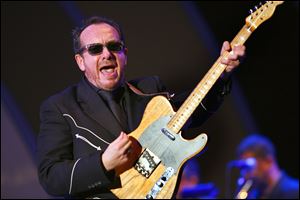
MUSIC
The politician British bands loved to hate
4/10/2013
Elvis Costello was critical of Margaret Thatcher's government in the 1980's in the song "Tramp the Dirt Down,"
LOS ANGELES — Margaret Thatcher, the so-called Iron Lady, was one of God’s gifts to music. In the history of popular music, there probably never has been a head of state more reviled in song than the former Conservative Party British prime minister, who died Monday at 87.
You could say that Thatcher exerted a remarkably creative influence on British music from the late ’70s through the late ’80s and beyond. The ridicule and rage heaped on her prompted some of the spikiest lyrics, angriest guitars and most indelible percussion to be heard during of one of the most rancorous eras in modern British music and politics.
During her 11-year reign, Thatcher was the politician who British musicians (and a few non-Brits) of many stripes — ska, punk, rock, New Wave, folk, reggae, even electronic dance music — loved to hate. The vitriolic song titles alone — never mind the lyrics — left listeners in no doubt about the depth of loathing: The English Beat’s “Stand Down Margaret”; Heaven 17’s “(We Don’t Need This) Fascist Groove Thang”; Klaus Nomi’s “Ding Dong! The Witch Is Dead”; The Specials’ “Ghost Town”; The Varukers’ “Thatcher’s Fortress”; the Larks’ “Maggie Maggie Maggie (Out Out Out)”; Morrissey’s “Margaret on the Guillotine”; and Elvis Costello’s “Tramp the Dirt Down.”
A couple years before Thatcher rose to power, the Sex Pistols had launched punk’s attack on the English public school power elite with “God Save the Queen,” proclaiming “there is no future in England’s dreaming.” But when Thatcher became the official face of Conservatism, British musicians and other artists instantly substituted her for the more benign Queen Elizabeth.
I lived in England from 1980 to 1982, and again in 1984. In many respects, it was a grim time economically and socially. Those years were marked by double-digit unemployment, a prolonged and bitter miners’ strike, a surreal war with Argentina (which Thatcher, in her Britannia battle-dress mode, championed from start to finish), vicious soccer hooliganism fed by neo-Nazi propaganda, escalating Cold War nuclear tensions, and ethnic-based rioting in London, Liverpool, and Bristol.
But musically, it was a brilliant period of innovation, and at least some of that dynamism was due to the massive youth discontent rumbling up from the streets of Brixton and Toxteth and Aberdeen. Much of the best pop music of the Thatcher years was a response to the perceived bleakness, and it expressed itself in different forms. On one side was the aggressively politicized engagement of groups such as The Clash and the early UB40 (whose name referred to a British unemployment benefits form).
At the other end was the flamboyant, clothes-horse escapism of larky New Romantics groups such as Duran Duran, Spandau Ballet, and Culture Club. But all these forms could be interpreted, at least partially, as responses to a growing sense of anger and confusion, if not despair, about the transformations unleashed on British society by Thatcher’s determinedly — some would say ruthlessly — free-market economic policies, which vivisected Britain’s decades-old social safety net.
In response, many young musicians got off the dole, picked up a guitar, and started to slash away at the Conservative agenda with what some young people thought was the only real weapon at their disposal: popular culture.